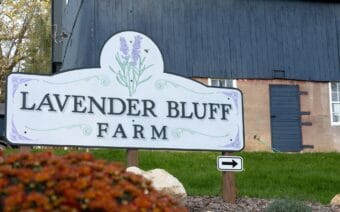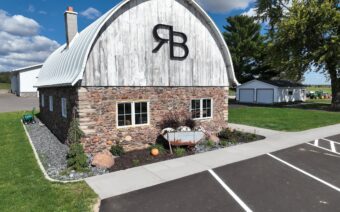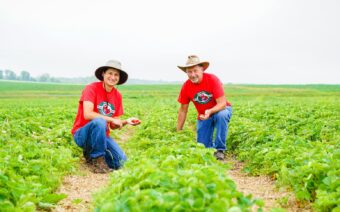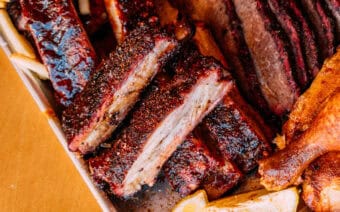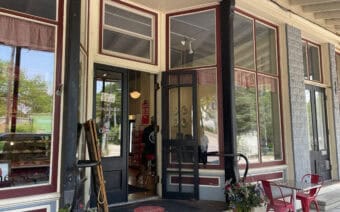
December 23, 2024
BOYCEVILLE – The Grain Bin Butchery & Market, located at E4548 Country Road FF in Boyceville, is more than your average meat shop.
Besides local residents being able to pick up staple grocery items and quality meats, Co-owner Jason McDonald said The Grain Bin is making a name for itself with its mobile butchery option.
“We provide on-site butchering and custom meat processing services for local farmers and their customers,” he said. “The farmer sells an animal directly to their customers. Animals are typically sold in quarters, halves and wholes. Farmers set their own meat prices, and our meat processing prices vary.”
What makes the service unique, McDonald said, is he and fellow Co-owner, Aron Dunn, travel on-site to provide butchering services.
“The live animal remains on the farm and does not have to be transported to a slaughter plant,” he said. “This saves time and stress for everyone, including the animal. Our mobile butcher unit drives to the farm, where the animal is humanely euthanized. We then transport the carcass to our butcher shop for processing.”
McDonald said once the carcass is transported to the plant, the meat is processed according to each customer’s specifications.
“We primarily operate within a 30-mile radius of our retail store, but we can travel outside of that radius for an additional mileage fee, and ideally, to process multiple animals,” he said. “The biggest town nearby is Menomonie, which is about (18) miles away.”
A complete list of cities within that 30-mile radius, McDonald said, is available at grainbinbutchery.com.
“The Grain Bin’s mobile slaughter service is available for cows, pigs, goats and sheep,” McDonald said. “We do not process poultry or rabbits. We recently even got a request for an emu.”
With the growing trend of increased beef prices and meat prices in general, McDonald said they are seeing more people raising their own animals for consumption.
“Most people don’t factor in that you would need a trailer to bring these animals to slaughter if they’re unable to do it themselves,” he said. “That’s where our mobile service comes into play. That used to be the only way things were done, but that kind of all disappeared except for a few places around. We decided to take advantage of that niche.”

McDonald said from January through October, The Grain Bin provides custom meat processing of beef, pork, sheep, goat and venison, but once November and December hit, they only process venison in conjunction with Wisconsin’s deer hunting season.
He said in accordance with the United States Department of Agriculture (USDA) guidelines, The Grain Bin can’t sell on-the-farm slaughtered meat at the store.
“We have a truck that’s specific to on-the-farm slaughters,” he said. “It has a crane on it, so we’re able to move these animals after they’re dispatched. We can reach out, go over fences, winch them in and do various things that we couldn’t do with a box truck. Our truck allows us to be a bit more mobile.”
One of the things The Grain Bin prides itself on, McDonald said, is cleanliness.
“That’s both in our shop and in the field,” he said. “If you think about all the things a farmer has to do with slaughtering an animal, it’s a lot. They have to euthanize it themselves, be able to skin and eviscerate it and then process it. We can do all of that for them with our mobile service.”
McDonald said there are other mobile butchery services out there, but he feels The Grain Bin is unique.
“If Aron and I are the two that do the slaughtering, we feel as though it’s very important to us and our customers to have that first-hand contact with them,” he said. “We can develop that customer relationship from the beginning and then follow that through.”
Peace of mind
Though farmers/customers frequently go through the slaughter process, McDonald said that doesn’t mean it’s easy for everyone involved.
To further support farmers/customers, McDonald said he and Dunn attended the Humane Handling Institute – a two-day course offered through the University of Wisconsin-River Falls.
“The course offered a lot of great things for small butchers,” he said. “That has helped us greatly in our business approach to put people at ease. It’s also helped us with our customer service along with our own knowledge base on the humane handling of these animals, euthanization and the best practices for that. The course has helped us mitigate possible problems.”
McDonald said it’s “extremely important” to him and Dunn to respect the process.
“We want to cause the least amount of stress on the animals and farmers as possible,” he said. “It is a lot less stress on the animals for us just to show up at the farm and know what we’re doing. Granted, they don’t like seeing us – sometimes the animals know something is up – but there’s way more stress in loading the animals on a trailer and having them in holding pens in a foreign area.”
Besides the Humane Handling Institute course, McDonald said he and Dunn both attended the University of Wisconsin-Madison Meat Processing School to get certified.
More options
Though McDonald said it’s ideal for him and Dunn to utilize the mobile butchery service as often as possible, there are other options for farmers.
He said they recently purchased a slaughter floor in Prairie Farm to add to its repertoire.
“That’s not listed on our website, but we also felt a need to have a USDA federally inspected space,” he said. “If a farmer wants to sell their own beef, it has to go through a USDA federally inspected facility. That’s where the slaughter floor comes in. We follow the trends of the law.”
For example, McDonald said if a farmer has a herd of 50 beef cattle he or she wants to slaughter and sell to the local grocery store, they can’t just simply do that on their own farm.
“It has to go through a federally inspected facility,” he said. “They’d have to make arrangements to transport the animals to the Prairie Farm facility for processing, then it could be sold on the open market.”
McDonald said there was a simple reason he and Dunn decided to purchase the slaughter floor.
“We did this to fill in the gaps from about February through May because all the hobby farmers get their animals in the spring, and then they butcher in the fall,” he said. “We did this to add another option for our customers. It’s part of our business plan.”
A meat processing background
McDonald said his passion for butchery goes back to about 2010.
He said he and Dunn began their journey as butchers by cutting for a friend’s shop in the central part of the state.
“That was part-time,” he said. “Then I started cutting deer at my own shop on my farm for a couple of years, and eventually, I drug Aron into it. There are legalities in Wisconsin in mixing products, and we weren’t able to do that without being a licensed meat shop in Wisconsin. We wanted to take it to the next level.”
McDonald said any Wisconsin resident can cut deer or any wild game without needing a license.
“You can open your own business out of your garage if you’d like,” he said. “There’s no regulation on cleanliness, sampling, etc. You can cut and package anything you want in Wisconsin for wild game, but once you start mixing beef and pork with it, you need a license to make consumable products like summer sausage, meat sticks, snack sticks, bologna, hot dogs, brats, etc.”

McDonald said when they decided to expand, he and Dunn looked at a handful of places to purchase.
“We settled on a building my parents owned at the time,” he said. “They had bulk foods and a bakery. Neither Aron nor I are bakers, but the building was perfect – it had three-phase power. We decided to purchase it and restructure the business to add on the butcher shop and get rid of the bakery.”
McDonald said that’s when conversations began about the mobile butchery option.
“That was about mid-COVID-19 time,” he said. “There’s a great need for more butcher shops and more processing facilities in our area, and we both had the desire to work for ourselves, so that brought us to purchasing this place. That was in 2022.”
More than just meat
Though The Grain Bin is proud to be Boyceville’s local butcher, McDonald said the shop also carries many grocery store items as well.
He said coffee, tea, bulk spices, honey, maple syrup, breakfast cereal, frozen pizza, bulk snacks, dried fruits, popcorn and candy are readily available at The Grain Bin.
McDonald said the meat cases at The Grain Bin are stocked with fresh cuts of beef, pork and chicken.
“We carry lunch meat, snack sticks, ribs, roasts, pork chops, bacon, bratwurst, hot dogs, pulled pork and more,” he said.
McDonald said his mother, Dawn, also has a quilt shop within the walls of The Grain Bin.
“She picked up the hobby when she was 10 years old from her great-grandmother, Ethel,” he said. “In 2011, with the encouragement of her friend Jackie, the quilt shop opened.”
McDonald said The Grain Bin also likes to support other businesses and farmers whenever possible by carrying their products at the market, including:
- Cedar Crest Ice Cream, made in Manitowoc
- Chetek’s Moose Lake Mustard
- Cheese curds from Taste and See Creamery in Boyceville
- Goat soap made by EB Ranch Farmstead in Ridgeland
Pure maple syrup from Generations of Andrews Syrup Company in Wheeler
 CEO of Menomonie chamber selected for U.S. Chamber Fellowship
CEO of Menomonie chamber selected for U.S. Chamber Fellowship At the forefront of the foundry industry’s future
At the forefront of the foundry industry’s future



